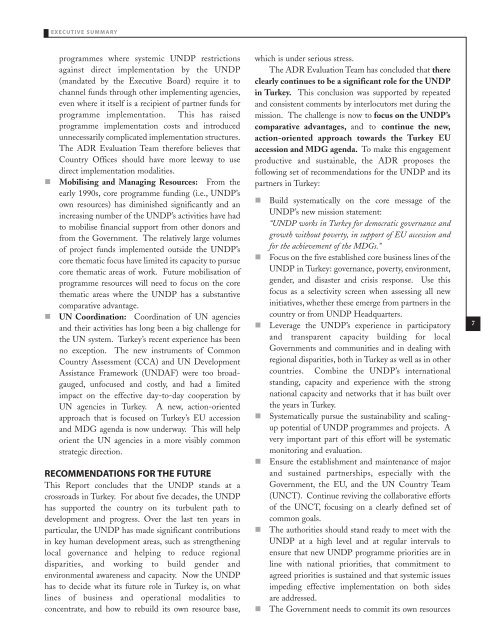Reports - United Nations Development Programme
Reports - United Nations Development Programme
Reports - United Nations Development Programme
Create successful ePaper yourself
Turn your PDF publications into a flip-book with our unique Google optimized e-Paper software.
EXECUTIVE SUMMARY<br />
programmes where systemic UNDP restrictions<br />
against direct implementation by the UNDP<br />
(mandated by the Executive Board) require it to<br />
channel funds through other implementing agencies,<br />
even where it itself is a recipient of partner funds for<br />
programme implementation. This has raised<br />
programme implementation costs and introduced<br />
unnecessarily complicated implementation structures.<br />
The ADR Evaluation Team therefore believes that<br />
Country Offices should have more leeway to use<br />
direct implementation modalities.<br />
Mobilising and Managing Resources: From the<br />
early 1990s, core programme funding (i.e., UNDP’s<br />
own resources) has diminished significantly and an<br />
increasing number of the UNDP’s activities have had<br />
to mobilise financial support from other donors and<br />
from the Government. The relatively large volumes<br />
of project funds implemented outside the UNDP’s<br />
core thematic focus have limited its capacity to pursue<br />
core thematic areas of work. Future mobilisation of<br />
programme resources will need to focus on the core<br />
thematic areas where the UNDP has a substantive<br />
comparative advantage.<br />
UN Coordination: Coordination of UN agencies<br />
and their activities has long been a big challenge for<br />
the UN system. Turkey’s recent experience has been<br />
no exception. The new instruments of Common<br />
Country Assessment (CCA) and UN <strong>Development</strong><br />
Assistance Framework (UNDAF) were too broadgauged,<br />
unfocused and costly, and had a limited<br />
impact on the effective day-to-day cooperation by<br />
UN agencies in Turkey. A new, action-oriented<br />
approach that is focused on Turkey’s EU accession<br />
and MDG agenda is now underway. This will help<br />
orient the UN agencies in a more visibly common<br />
strategic direction.<br />
RECOMMENDATIONS FOR THE FUTURE<br />
This Report concludes that the UNDP stands at a<br />
crossroads in Turkey. For about five decades, the UNDP<br />
has supported the country on its turbulent path to<br />
development and progress. Over the last ten years in<br />
particular, the UNDP has made significant contributions<br />
in key human development areas, such as strengthening<br />
local governance and helping to reduce regional<br />
disparities, and working to build gender and<br />
environmental awareness and capacity. Now the UNDP<br />
has to decide what its future role in Turkey is, on what<br />
lines of business and operational modalities to<br />
concentrate, and how to rebuild its own resource base,<br />
which is under serious stress.<br />
The ADR Evaluation Team has concluded that there<br />
clearly continues to be a significant role for the UNDP<br />
in Turkey. This conclusion was supported by repeated<br />
and consistent comments by interlocutors met during the<br />
mission. The challenge is now to focus on the UNDP’s<br />
comparative advantages, and to continue the new,<br />
action-oriented approach towards the Turkey EU<br />
accession and MDG agenda. To make this engagement<br />
productive and sustainable, the ADR proposes the<br />
following set of recommendations for the UNDP and its<br />
partners in Turkey:<br />
<br />
<br />
<br />
<br />
<br />
<br />
<br />
Build systematically on the core message of the<br />
UNDP’s new mission statement:<br />
“UNDP works in Turkey for democratic governance and<br />
growth without poverty, in support of EU accession and<br />
for the achievement of the MDGs.”<br />
Focus on the five established core business lines of the<br />
UNDP in Turkey: governance, poverty, environment,<br />
gender, and disaster and crisis response. Use this<br />
focus as a selectivity screen when assessing all new<br />
initiatives, whether these emerge from partners in the<br />
country or from UNDP Headquarters.<br />
Leverage the UNDP’s experience in participatory<br />
and transparent capacity building for local<br />
Governments and communities and in dealing with<br />
regional disparities, both in Turkey as well as in other<br />
countries. Combine the UNDP’s international<br />
standing, capacity and experience with the strong<br />
national capacity and networks that it has built over<br />
the years in Turkey.<br />
Systematically pursue the sustainability and scalingup<br />
potential of UNDP programmes and projects. A<br />
very important part of this effort will be systematic<br />
monitoring and evaluation.<br />
Ensure the establishment and maintenance of major<br />
and sustained partnerships, especially with the<br />
Government, the EU, and the UN Country Team<br />
(UNCT). Continue reviving the collaborative efforts<br />
of the UNCT, focusing on a clearly defined set of<br />
common goals.<br />
The authorities should stand ready to meet with the<br />
UNDP at a high level and at regular intervals to<br />
ensure that new UNDP programme priorities are in<br />
line with national priorities, that commitment to<br />
agreed priorities is sustained and that systemic issues<br />
impeding effective implementation on both sides<br />
are addressed.<br />
The Government needs to commit its own resources<br />
7

















